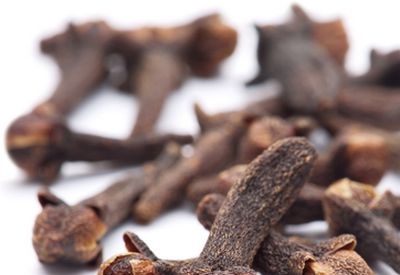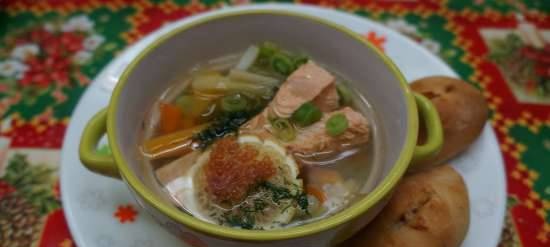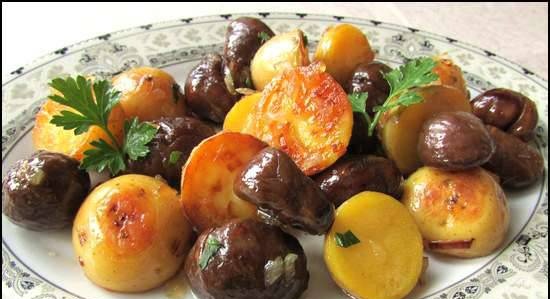|
 Clove belongs to the class of classic spices. It is a flower of a tree from the myrtle family, dried in the bud stage. From the Moluccas, the spice was brought to India, Tanzania, Indonesia, Madagascar, Ceylon, where it is successfully cultivated. Cloves produce bountiful harvests twice a year, making them inexpensive and widely used. Clove belongs to the class of classic spices. It is a flower of a tree from the myrtle family, dried in the bud stage. From the Moluccas, the spice was brought to India, Tanzania, Indonesia, Madagascar, Ceylon, where it is successfully cultivated. Cloves produce bountiful harvests twice a year, making them inexpensive and widely used.
The buds are collected and dried in direct sunlight until they begin to emit a specific crackle when breaking. After a while, the petiole, even in a dried carnation, becomes bent again, and if you press it against the paper, a greasy mark will remain. This speaks of the excellent quality of the spice. You can also check the quality of the clove by forcibly throwing it into a cup of water - it should sink to the bottom, or at least float up with its bud. If the spice floats horizontally, its quality is questionable. It is not customary to grind cloves into powder, as they quickly lose their aroma and are not suitable for consumption. And her smell is very strong, and the taste is quite pungent, and the aroma is mainly concentrated in the bud itself, and the taste is in its petioles. Knowing this, it is best not to use hats for making sweet dishes.
Extracted from clove and oil, which is used in the perfume industry and in making alcoholic beverages .
Culinary experts use spice for cooking meat, vegetable , mushroom, fish and fruit marinades. Confectioners use a mixture of spices for baking, which also includes cloves. So, for example, for baking and compotes, it is used in combination with cinnamon; for cooking fried meat, minced meat, meat broth, sauces - with black pepper.
 The time of laying cloves in different dishes differs. Spice is added to marinades during cooking, along with other ingredients, to minced meat or dough - even before cooking, to meat dishes - ten to fifteen minutes until fully cooked, to compotes and soups - five minutes before the end of cooking. This is important because the spice conveys its taste, smell and brown color both in hot water and in cold water. If you need to convey a more delicate, refined aroma to a dish, cloves should be laid as late as possible, because when boiled, its smell evaporates, and the liquid acquires a bitter unpleasant taste. You should be very careful with marinades, in which cloves are placed before boiling, and observe the norms for laying it: no more than two grams per ten kilograms of mushrooms, only three to four grams per 10 liters of marinade for fruits and vegetables. Once upon a time, these norms were much higher - one gram per one liter of filling. This is due to the fact that before, apart from black pepper and cloves, they did not know other spices and their quantity tried to fill the gap in quality, diversify or enhance the taste of the product. In fact, part of the clove needs to be reduced, proportionally increasing the part of the other spices. You should also be careful with the dosage of cloves in combination with liquids containing alcohol, because in alcohol its bitterness is even more pronounced, which makes the taste of the product unpleasant and even harmful to health. The time of laying cloves in different dishes differs. Spice is added to marinades during cooking, along with other ingredients, to minced meat or dough - even before cooking, to meat dishes - ten to fifteen minutes until fully cooked, to compotes and soups - five minutes before the end of cooking. This is important because the spice conveys its taste, smell and brown color both in hot water and in cold water. If you need to convey a more delicate, refined aroma to a dish, cloves should be laid as late as possible, because when boiled, its smell evaporates, and the liquid acquires a bitter unpleasant taste. You should be very careful with marinades, in which cloves are placed before boiling, and observe the norms for laying it: no more than two grams per ten kilograms of mushrooms, only three to four grams per 10 liters of marinade for fruits and vegetables. Once upon a time, these norms were much higher - one gram per one liter of filling. This is due to the fact that before, apart from black pepper and cloves, they did not know other spices and their quantity tried to fill the gap in quality, diversify or enhance the taste of the product. In fact, part of the clove needs to be reduced, proportionally increasing the part of the other spices. You should also be careful with the dosage of cloves in combination with liquids containing alcohol, because in alcohol its bitterness is even more pronounced, which makes the taste of the product unpleasant and even harmful to health.
IN test cloves should be only a fifth or even a seventh of all the spices that are included in the recipe. Based on a kilogram of ingredients for the dough, then four to five cloves can be added. Soups and compotes add a maximum of three cloves per liter of liquid. The meat is fried with ground cloves, and stewed with a whole, laying two caps per serving, and the rate of cloves is halved if the dish contains other spices.
Kuzminova Lyudmila Borisovna
|
 Clove belongs to the class of classic spices. It is a flower of a tree from the myrtle family, dried in the bud stage. From the Moluccas, the spice was brought to India, Tanzania, Indonesia, Madagascar, Ceylon, where it is successfully cultivated. Cloves produce bountiful harvests twice a year, making them inexpensive and widely used.
Clove belongs to the class of classic spices. It is a flower of a tree from the myrtle family, dried in the bud stage. From the Moluccas, the spice was brought to India, Tanzania, Indonesia, Madagascar, Ceylon, where it is successfully cultivated. Cloves produce bountiful harvests twice a year, making them inexpensive and widely used.




